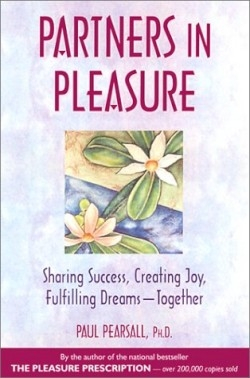
Partners in Pleasure
Sharing Success Creating Joy Fulfilling Dreams--Together
Welcome to the antithesis of the self-help book. Pearsall presents a “we-centered” relationship guide rather than the ubiquitous “me-centered, you-can-do-it-alone” volume.
Using a legend from his native Hawaii, the author frames his argument around the story of the naupaka blossom. This flower grows petals that are incomplete by half, symbolizing the individual without a partner. “The naupaka principle teaches, despite society’s current rampant individualism, we end up living our life half-heartedly when we fail to connect fully with another heart.”
Throughout the work, the application of ancient Hawaiian concepts to modern life provides a new way to think about life partners. Readers will learn about water thinking—the Hawaiian way of regarding individuals as water, so partners become interrelated, flowing in and out of one another and intermingling as one— versus the Continental way of rock thinking—one rock plus one rock equals two rocks coexisting—how Pearsall views most marriages.
Pearsall knows relationships. He has written a dozen “help” books, both self- and relationship-oriented, including The Ten Laws of Lasting Love and Super Immunity: Master Your Emotions and Improve Your Health. His latest publication is based on his clinical work and findings from over 2,000 couples at Sinai Hospital of Detroit and in worldwide seminars. Personal insights also give this work credibility, including his surviving cancer, and how his sound relationship contributed to his healing.
The book is practical as well as philosophical: it is divided into eight “pleasure prescriptions” from “Dreaming the Same Dream” to “Connect Heart to Heart.” Each chapter includes exercises and questionnaires that help couples look at the attitudes underlying their relationships.
The tone of Pearsall’s instruction is kindly and wise, as one elder native to a younger member of the same tribe. The use of Hawaiian legends and words (interpreted) adds to this shaman-like way of teaching.
Not all the information included is “feel-good” panacea. An idea that may bristle some is the de-romanticizing of relationships. In modern Western culture, “love is seen as an involuntary feeling rather than an important choice, something that happens to us rather than a way of living.” Pearsall focuses the reader’s attention on the commitment of love rather than the nuances of love.
This guide does a fine job of making readers who have been raised under the banner of “do your own thing” rethink this philosophy and expand it to “do our thing” as partners in pleasure.
Reviewed by
Vicki Stewart
Disclosure: This article is not an endorsement, but a review. The publisher of this book provided free copies of the book to have their book reviewed by a professional reviewer. No fee was paid by the publisher for this review. Foreword Reviews only recommends books that we love. Foreword Magazine, Inc. is disclosing this in accordance with the Federal Trade Commission’s 16 CFR, Part 255.
